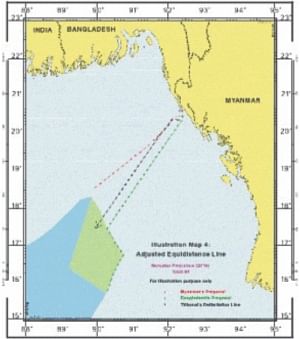| Home - Back Issues - The Team - Contact Us |
 |
| Volume 11 |Issue 26| June 29, 2012 | |
|
|
Neighbours Engage Myanmar More Deeply Brig Gen Shahedul Anam Khan Ndc, Psc (retd)
It would seem that the only matter that defines the bilateral relationship between Bangladesh and Myanmar is the Rohingya issue. There was of course the matter of maritime boundary which has been solved with both parties becoming the beneficiary of the arbitration ruling. That Rohingya issue should predicate our bilateral policy is not unnatural, but what is quite inexplicable is that the bilateral relationship has not moved very much beyond this in the last 40 years that the two countries had established diplomatic relationship. We are not even physically connected, either by road or by air. And the river Naf, the midstream of which defines the international boundary between the two countries has been a divide rather than a connection between the two. In spite of the much flaunted 'Look-east Policy' apparently our eastward gaze has not been able to focus fully on our immediate eastern neighbour -- one of the only two neighbours we have. That validates the criticism that our foreign policy had at best been ad hoc and we were given to playing it by ears as and when a situation occurred, a rather precarious way of conducting a country's foreign policy. It also shows an awful lack of continuity of our policy. We failed to take note when the political situation was simmering in Myanmar in 1988. Being severely screened by a government that was busy fighting insurgency in almost all its states, we had very little knowledge of what was actually going on in that country, and quite happy to leave it to its own devices, fearing that warming up to a neighbour that had been declared a pariah by the international community might invite adverse reaction from our development partners. The 70's and 80s were a period of ambiguous relationship with little more than normal diplomatic business. Neither did we explore the potential of trade nor did we indulge in any sort of strategic calculations given the great strategic significance of the country that has been multiplied greatly by the concentration of a huge quantity of natural resources, particularly of oil and gas. And that is the reason that when the Myanmar junta was ostracized for almost two decades we found clandestine connection between some western corporations and the military in Yangon. We expected little, if any, physical threat from the country, given its preoccupation with combating ethnic unrest. Nor did we anticipate any fallout from the situation created by the country's insurgency movements. Surprisingly too, we slept literally on the issue of maritime demarcation for nearly 25 years, till we realised that we have problems in our hands, that the part of the Bay, integral to our territory, is being contested by our neighbours. The foregoing factors, coupled with our single-country thrust, with most of our energy and resources devoted to India, some more during one regime than the other, had caused Myanmar to literally vanish from our strategic radar. Our Myanmar policy has best been reactive. We have only woken up once confronted with a situation involving our eastern neighbour. And that too our reaction has been issue oriented, tailor-made to address a particular situation without infusing it with adequate substance to address the issues on a long-term basis.
This time too it was the Rohingya issue that has brought the two countries to some sort of visible direct engagement, the last occasion being when the BN ships were poised against the Myanmar drilling rigs in the Bay that we claimed to be our territory. And on that occasion Myanmar chose discretion to any precipitate action. Thankfully, a conflict situation with Myanmar was avoided; but the 2008 Bay incident had the makings of a protracted naval deployment with the potential of a conflict. The maritime issue had unfortunately spilled over onto the land, with the BDR being then confronted by a heavily reinforced border security force of Myanmar along the Bangla-Myanmar border. The Korean exploration rig, that encroached into our territorial waters in the area of block-13 backed up by two Myanmar man-of-war, was withdrawn inside Myanmar waters, and whatever reason they would like to cite for doing so, the major motivation undoubtedly was the physical demonstration by the Bangladesh Navy of our resolve to protect our national interest and our territory at all cost. As far as the Rohingya situation is concerned, it is an indispensable narrative in the text of Bangladesh-Myanmar relationship. However, most observers are agreed on the need to see this as but only one aspect of our bilateral relationship which should not be allowed to weigh down the entire gamut of involvement between the two neighbours. Bangladesh's experience with these Myanmar refugees has been very painful. It has had fallouts in various spheres of our national life, most of all on the international job market. That the Rohingyas have also been exploited politically both in their own country and in Bangladesh is not very well known. They continue to be stateless in Myanmar, with no basic rights. And when they face persecution at home and seek shelter in Bangladesh they are exploited by the local politicians, and used as vote banks in this country. They could not have registered themselves as voters and acquired Bangladeshi passports without the collusion of the politically powerful of the area. The moot question is whether we will ever see a resolution of the Rohingya issue. The pessimists are of the opinion that given the predominating Burman population which is not willing to countenance any other major ethnic group, a strange phenomenon in a country that is habited by more than a dozen ethnic groups, the Arakanese Muslims may not get the recognition as citizens of Myanmar. And this is where not only Bangladesh but the international community should bring to bear influence on the government of Myanmar. There is a sea change politically in Myanmar. But it seems that we are putting too much confidence on Suu Kyi to resolve the Rohingya issue. Her remarks in Oslo recently when asked to comment on the Rohingya issue cannot be encouraging. When asked to comment on the matter she said that Myanmar must clarify citizenship laws underlying ethnic tensions in the country and that she was unsure if Muslim Rohingyas at the centre of clashes were Myanmar nationals. Myanmar is and will continue to be an important neighbour. Our bilateral relationship should not be contingent upon only one issue, and that has been well recognised by our foreign office. There has been a definite change in thrust with the visit of our foreign minister and prime minister to Myanmar. The Myanmar President is due in July. And one would hope that while intractable issue may be sidelined to move our bilateral relationship forward, it will not be forgotten that such issues, if kept out for too long, will accrete in intensity and cause more trouble in the future.
The author is Editor, OP-Ed and Defence and Strategic Affairs, The Daily Star
|
||||
Copyright
(R) thedailystar.net 2012 |

